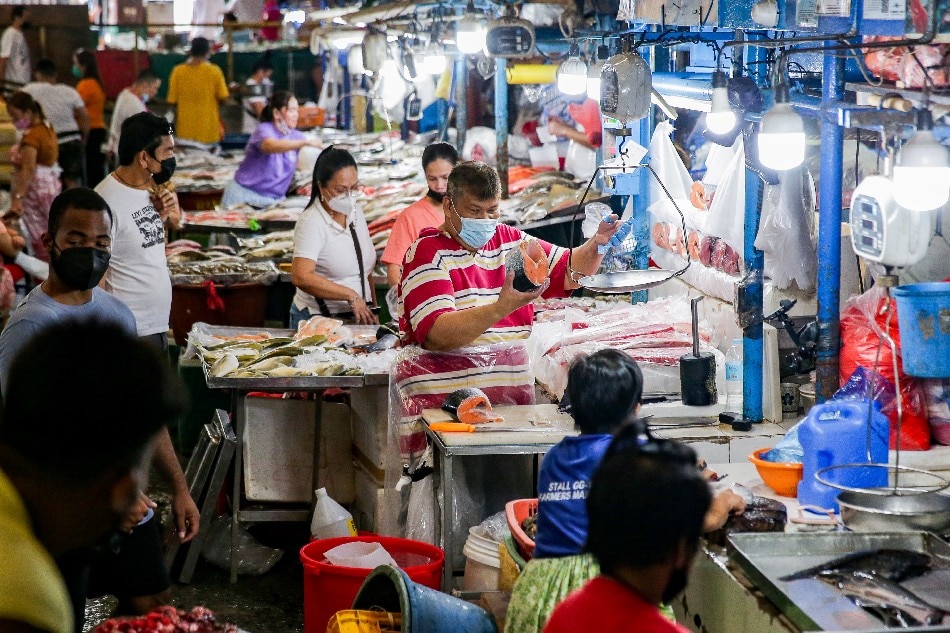No food, oil shortage despite Russia-Ukraine crisis: Finance chief | ABS-CBN
ADVERTISEMENT

Welcome, Kapamilya! We use cookies to improve your browsing experience. Continuing to use this site means you agree to our use of cookies. Tell me more!
No food, oil shortage despite Russia-Ukraine crisis: Finance chief
No food, oil shortage despite Russia-Ukraine crisis: Finance chief
Jessica Fenol and Jekki Pascual,
ABS-CBN News
Published Apr 05, 2022 05:11 PM PHT
MANILA - Finance Secretary Carlos Dominguez on Tuesday allayed fears of food and oil shortages amid the ongoing conflict between Russia and Ukraine.
MANILA - Finance Secretary Carlos Dominguez on Tuesday allayed fears of food and oil shortages amid the ongoing conflict between Russia and Ukraine.
During the Philippine Economic Briefing 2022, Dominguez said there is no shortage of commodities, fuel, corn or wheat.
During the Philippine Economic Briefing 2022, Dominguez said there is no shortage of commodities, fuel, corn or wheat.
Russia is among the top producers of oil while both Russia and Ukraine are exporters of wheat, which is milled into flour.
Russia is among the top producers of oil while both Russia and Ukraine are exporters of wheat, which is milled into flour.
"There is no shortage of commodities, fuel, corn, or wheat...It’s the anticipation of shortages that is driving up prices. It's affecting us negatively but we are confident that since our agriculture production in the Philippines, particularly for staple food, is constant, especially rice. We have to manage that very well," Dominguez said.
"There is no shortage of commodities, fuel, corn, or wheat...It’s the anticipation of shortages that is driving up prices. It's affecting us negatively but we are confident that since our agriculture production in the Philippines, particularly for staple food, is constant, especially rice. We have to manage that very well," Dominguez said.
ADVERTISEMENT
The Finance chief also said there is no global shortage of pork.
The Finance chief also said there is no global shortage of pork.
The Philippines, which was hit by the African Swine Fever, is currently restocking its inventory while importing meat to augment its supply.
The Philippines, which was hit by the African Swine Fever, is currently restocking its inventory while importing meat to augment its supply.
World oil forecasts were also "much lower" than the current market price, he said.
World oil forecasts were also "much lower" than the current market price, he said.
"We think as the year goes on, prices of commodities start moderating downwards," he said.
"We think as the year goes on, prices of commodities start moderating downwards," he said.
DA SEEKS AGRI BOOST
In the same briefing, Agriculture Secretary William Dar said the next administration should continue reforms instituted by the current leaders.
In the same briefing, Agriculture Secretary William Dar said the next administration should continue reforms instituted by the current leaders.
Dar said the Rice Tariffication Law has improved the rice supply in the country, which in turn helped stabilize inflation.
Dar said the Rice Tariffication Law has improved the rice supply in the country, which in turn helped stabilize inflation.
Dar agreed that there was no food shortage. In fact, there has been an increase in productivity and food security in the country.
Dar agreed that there was no food shortage. In fact, there has been an increase in productivity and food security in the country.
Sufficiency level jumped to 92 percent from 87 percent in 2019, he said.
Sufficiency level jumped to 92 percent from 87 percent in 2019, he said.
But Dar said the DA's P85 billion per year budget, or about 1.7 percent of the total national budget, could be improved.
But Dar said the DA's P85 billion per year budget, or about 1.7 percent of the total national budget, could be improved.
Other ASEAN countries' agriculture budget is around 4 to 5 percent of their national budget, he said.
Other ASEAN countries' agriculture budget is around 4 to 5 percent of their national budget, he said.
RELATED VIDEO:
ADVERTISEMENT
ADVERTISEMENT



